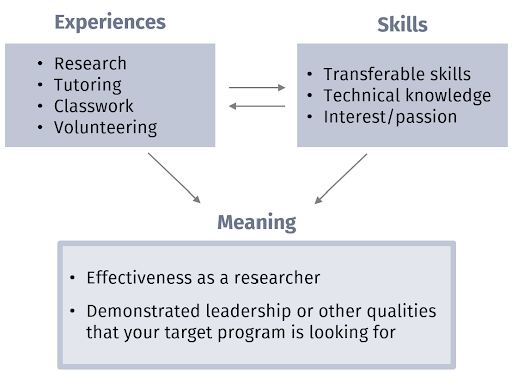

Statement of Purpose for Graduate School
Criteria for success.
- qualified for their program, and
- a good fit for their program’s focus and goals.
- You show a select group of skills and experiences that concisely convey your scientific accomplishments and interests.
- Your experiences are concrete and quantitative .
- Your personal statement is no more than 2 pages (less if you can, or if it is required by the school).
Structure Diagram
The graduate school Personal Statement (≈ Statement of Purpose ≈ Statement of Intent) is a document that complements your resume and application form, describing your profile in a narrative way and convincing the admission committee that you would be a good match for a particular department or program. Take into account that matching goes both ways: they should be interested in you, and you should be interested in them. Your personal statement should make this match clear.
Analyze Your Audience
Your personal statement will be read by a graduate committee – a handful of faculty from the program. They’re trying to determine if you will be a successful graduate student in their department and a successful scientist after you graduate. They are interested in your qualifications as a researcher, your career goals, and how your personality matches their labs and department.
The graduate committee probably reads hundreds of applications every year. To make it easy for them to figure out that you are a good fit, keep in mind the following suggestions:
- Make direct, concrete statements about your accomplishments and qualifications.
- Create a narrative that serves as a personal brand and helps them remember you.
- Give them some unique examples that describe you and make you stand out, and which will make them remember you as “that candidate that was so passionate about…” or “who has a lot of experience in…”, although they might not remember your name.
- Align your academic goals and motivations with specific research projects or research directions of the target department.
Assessing your match to the target program
A key point on writing your Personal Statement is to demonstrate that you have done previous research about the program to which you’re applying, that you understand its characteristics and objectives, and that you are really interested in joining it and willing to do your best to be successful in it. To do this:
- Read the program’s website. Learn about its faculty members and the projects they are working on. Check what topics and high level goals the department is committed to. Identify the main research areas.
- Get in contact with faculty and students in your target program. Browse recent publications and presentations but remember lab websites can be outdated and a publication may lag a few years behind the active research in a lab so pay attention to the motivation, direction, and methods of the faculty member over specific results. If you have had a positive discussion with someone at the department, you can include in your essay how those interactions confirmed that you would be a good match for the program.
Reflect before you start
To convince a graduate committee that you are ready for and excited about graduate school, first you need to be able to articulate this to yourself. Earnestly reflect on the following types of questions. A lack of authenticity is easy to detect.
- Why do I want to go to graduate school?
- How am I sure?
- Why will I be successful in graduate school?
- What can I do with the help of this degree that I couldn’t do before?
- Where do I want to be in a few years?
- How am I going to get there?
Create a personal narrative
Graduate programs invest in the professional and scientific growth of their students. Get the committee excited about investing in you by opening your essay with a brief portrait of what drives you as a scientist. What research directions are you passionate about, and why? What do you picture yourself doing in 10 years?
- E.g. “Graduate study is the first step towards my goal: I want to improve my ability as a researcher and gain more technical depth and breadth to maximize my impact. In the long term, I hope graduate school will better position me to be a leader in shaping the conversation about what problems can be addressed by mechanical engineers.”
Close your essay with a 2-3 sentence discussion of your long-term career interests. No one will hold you to this; this just helps your committee visualize your potential trajectory.
- E.g. “Above all else, a MIT PhD would help me achieve my long term career goal of becoming a professor, the position in which I can best see myself accomplishing my mission to show others the hidden beauty in everyday life through science.”
Connect your personal narrative to whichever degree you are applying to (be it research-based or course-work-based, or a Master of Science, Master of Engineering, or PhD). Especially in mechanical engineering, each of these degrees will enable different career trajectories and provide different educational opportunities. Articulate clearly why the degree you are applying for helps you achieve your goals. In the same vein, consider mutual benefit: what will you contribute to the academic community over your time at your target school? Remember, it all comes back to “qualified match” , no matter what level of degree you are applying for.
Describe your experiences
Experiences are the “what” of your essay. They are the most efficient and easiest way to prove your capabilities to the admissions committee.
- What experiences led you to develop your skill set and passions ?
- Where have you demonstrated accomplishment, leadership, and collaboration?
- Show your depth with a range of experiences: research, teaching, relevant extracurriculars and leadership positions.
- State concrete achievements and outcomes like awards, discoveries, or publications, or projects completed.
Achievements need not be limited to research projects or publications. Think about all the experiences that demonstrate your ability to conduct research and succeed within the structure of your target program. (Where have you demonstrated creativity? Self sufficiency? Perseverance? What open ended problems have you tackled? What enabled you to succeed at them?)
Quantify your experiences to show concrete impact. How many people were on your team? How many protocols did you develop? How many people were in competition for an award? As a TA, how often did you meet with your students?
For each experience you include, focus on how the experience affected you. Describe your actions, and always direct the message to highlighting your performance and growth (not how important the company was or how well-known the professor you TAed for is). Remember, it is not an essay about science, it is a personal essay—about you and how you have positioned yourself to succeed in graduate school.
Explain the meaning of your experiences

Your goal in sharing your experiences is to demonstrate that you have the qualifications, qualities, and drive needed to succeed in graduate school. Therefore, you will need to not only choose experiences wisely but also state specifically what they mean within the context of your application.
- Why was this experience important to your growth as a scientist?
- What did you gain from or demonstrate during that experience?
- How will this make you a better grad student?
Even if it feels obvious to you, you need to explicitly answer these questions to your audience. Here are some examples experiences that have been expanded to contain meaning:
Contemplate how disparate activities can be unified into a common narrative about your motivations and achievements. Articulate this clearly to make your statement cohesive.

Demonstrate your match to the target program
Using the research you did to assess your chosen programs, clearly articulate why you are a match . Consider both directions of the match: not only why you want to go to the school, but also why you would fit in well and contribute to the program.
State which professors in the program you would be interested in working with. Demonstrate that you have done your homework regarding the program. Show how their research areas align with your background and your goals. If you have had conversations with students or professors in the program, be sure to include that as well.
Common Pitfalls
Write about you , not your role models. One of the most common pitfalls we see in the Comm Lab is students writing touching Personal Statements about family members or role models who have inspired them. There is nothing wrong with including personal stories about people who have helped you understand yourself better, or positioned you to succeed in graduate school, but it is important to tread very carefully. Don’t leave the reader wondering why they are reading about someone else in a document that is meant to be about you. If you take time to talk about someone who positively affected you, make sure to be very clear about how that experience with that person molded you into a strong graduate school candidate.
Be judicious with childhood stories. A brief mention of some childhood experience that shaped your interests in STEM is probably okay, but if you talk about it at length (more than ~2 sentences), you are taking up space that should probably be used to talk about who you are today, not who you were over a decade ago.
Don’t simply restate your resume. Your Personal Statement should be a technical document (having evidence, numbers, and supporting facts) with personal outcomes (talking about your motivations, ambitions, and ability to succeed as a graduate student). Of course, you will reiterate parts of your resume in your Personal Statement , but what uniquely makes it a “Personal Statement” is the discussion of how those professional experiences affected you , as a researcher and person well-suited to the graduate program at X University.
Insufficient quantification of your experiences. We are all scientists and engineers; our line of work is inherently quantitative. Quantification is a quick and easy way to add context, lend credence to your experiences, and impress the reader. Even little quantifications can help: “I spent two semesters working on a project about…” is much better than “I spent some time working on a project about…”. See more examples in the section on Experiences, above.
Being a great student and having an impressive resume is only half the battle when it comes to graduate school applications. You need to be able to communicate and convince the committee that your personality and particular set of skills and experiences are well-suited to the graduate program you are applying for. This extends beyond graduate school applications: as scientists and engineers, we write papers and technical reports to communicate with our peers and convince them that our work is meaningful.
By reading this article, you have recognized the value of communication and are well on your way to crafting an effective and powerful Personal Statement. This is your opportunity to make yourself shine among all the other candidates, so make it count! You can do it!
Acknowledgements : This content was adapted from the NSE and CEE Communication Labs’ CommKits for graduate applications.
Resources and Annotated Examples
Annotated example 1, annotated example 2.

How To Write a Statement of Purpose for Graduate School

Congratulations! You’ve chosen a graduate program , read up on tips for applying to grad school , and even written a focused grad school resumé . But if you’re like many students, you’ve left the most daunting part of the application process for last—writing a statement of purpose. The good news is that the task doesn’t have to feel so overwhelming, as long as you break the process down into simple, actionable steps. Below, learn how to write a strong, unique statement of purpose that will impress admissions committees and increase your chances of getting into your dream school.
What is a statement of purpose?
A statement of purpose (SOP), sometimes referred to as a personal statement, is a critical piece of a graduate school application that tells admissions committees who you are, what your academic and professional interests are, and how you’ll add value to the graduate program you’re applying to.
Jared Pierce, former associate director of enrollment services at Northeastern University, says a strong statement of purpose can be the deciding factor in a graduate student’s admission.
“Your statement of purpose is where you tell your story about who you are and why you deserve to be a part of the [university’s] community. It gives the admissions committee the chance to get to know you and understand how you’ll add value to the classroom,” he says.
How long should a statement of purpose be? “A statement of purpose should be between 500 and 1,000 words,” Pierce says, noting that it should typically not exceed a single page. He advises that students use a traditional font at a readable size (11 or 12 points) and leave enough white space in the margins to make the statement easy to read. Make sure to double-space the statement if the university has requested it, he adds.
How to write a statement of purpose: a step-by-step guide
Now that you understand how to format a statement of purpose, you can begin drafting your own. Getting started can feel daunting, but Pierce suggests making the process more manageable by breaking down the writing process into four easy steps.
1. Brainstorm your ideas.
First, he says, try to reframe the task at hand and get excited for the opportunity to write your statement of purpose.
“Throughout the application process, you’re afforded few opportunities to address the committee directly,” he explains. “Here is your chance to truly speak directly to them. Each student arrives at this process with a unique story, including prior jobs, volunteer experience, or undergraduate studies. Think about what makes you you and start outlining.”
When writing your statement of purpose, Pierce suggests asking yourself these key questions:
- Why do I want this degree?
- What are my expectations for this degree?
- What courses or program features excite me the most?
- Where do I want this degree to take me, professionally and personally?
- How will my unique professional and personal experiences add value to the program?
Jot these responses down to get your initial thoughts on paper. This will act as your starting point for creating an outline and writing your first draft.

2. Develop an outline.
Next, you’ll want to take the ideas that you’ve identified during the brainstorming process and plug them into an outline that will guide your writing.
An effective outline for your statement of purpose might look something like this:
- An attention-grabbing hook
- A brief introduction of yourself and your background as it relates to your motivation behind applying to graduate school
- Your professional goals as they relate to the program
- Why you’re interested in the specific school and what you can bring to the table
- A brief summary of the information presented in the body that emphasizes your qualifications and compatibility with the school
An outline like the one above will give you a roadmap to follow so that your statement of purpose is well organized and concise.
3. Write the first draft.
Your statement of purpose should communicate who you are and why you are interested in a particular program, but it also needs to be positioned in a way that differentiates you from other applicants.
Admissions professionals already have your transcripts, resumé, and test scores; the statement of purpose is your chance to tell your story in your own words.
When you begin drafting content, make sure to:
- Provide insight into what drives you , whether that’s professional advancement, personal growth, or both.
- Demonstrate your interest in the school by addressing the unique features of the program that interest you most. For Northeastern, he says, maybe it’s experiential learning; you’re excited to tackle real-world projects in your desired industry. Or perhaps it’s learning from faculty who are experts in your field of study.
- Be yourself. It helps to keep your audience in mind while writing, but don’t forget to let your personality shine through. It’s important to be authentic when writing your statement to show the admissions committee who you are and why your unique perspective will add value to the program.
4. Edit and refine your work.
Before you submit your statement of purpose:
- Make sure you’ve followed all directions thoroughly , including requirements about margins, spacing, and font size.
- Proofread carefully for grammar, spelling, and punctuation.
- Remember that a statement of purpose should be between 500 and 1,000 words. If you’ve written far more than this, read through your statement again and edit for clarity and conciseness. Less is often more; articulate your main points strongly and get rid of any “clutter.”
- Walk away and come back later with a fresh set of eyes. Sometimes your best ideas come when you’re not sitting and staring at your computer.
- Ask someone you trust to read your statement before you submit it.
Making a lasting impression
Your statement of purpose can leave a lasting impression if done well, Pierce says. It provides you with the opportunity to highlight your unique background and skills so that admissions professionals understand why you’re the ideal candidate for the program that you’re applying to. If nothing else, stay focused on what you uniquely bring to the classroom, the program, and the campus community. If you do that, you’ll excel.
To learn more tricks and tips for submitting an impressive graduate school application, explore our related grad school success articles .
Need more application help?
Join one of our application workshops to get your questions answered.
Register here
Editor’s note: This article was originally published in March 2017. It has since been updated for thoroughness and accuracy.
Subscribe below to receive future content from the Graduate Programs Blog.
About shayna joubert, related articles, grad school application advice: what prospective students need to know.

5 Expert Tips for Writing a Stand-Out Grad School Resumé

How To Request a Grad School Recommendation Letter
Did you know.
Advanced degree holders earn a salary an average 25% higher than bachelor's degree holders. (Economic Policy Institute, 2021)
Northeastern University Graduate Programs
Explore our 200+ industry-aligned graduate degree and certificate programs.
Most Popular:
Tips for taking online classes: 8 strategies for success, public health careers: what can you do with an mph, 7 international business careers that are in high demand, edd vs. phd in education: what’s the difference, 7 must-have skills for data analysts, in-demand biotechnology careers shaping our future, the benefits of online learning: 8 advantages of online degrees, the best of our graduate blog—right to your inbox.
Stay up to date on our latest posts and university events. Plus receive relevant career tips and grad school advice.
By providing us with your email, you agree to the terms of our Privacy Policy and Terms of Service.
Keep Reading:

Top Higher Education Conferences To Attend in 2024

Grad School or Work? How To Balance Both

Is a Master’s in Computer Science Worth the Investment?

Should I Go to Grad School: 4 Questions To Consider

IMAGES
VIDEO
COMMENTS
A statement of purpose is a key part of graduate school applications. Our guide explains how to write one that aligns your goals with your program's expectations.…
Hopefully, this new guide will explain those concerns and give you actionable steps you can take to write a high-impact statement of purpose that doesn't get bogged down in minutiae and actually enhances your chance of admission.
What’s a Good Statement of Purpose? Your application to any graduate program at the GSE requires you to submit a statement of purpose. We attach great importance to the statement. A …
A statement of purpose for a PhD program is more than just a formal requirement for the application process; it is a critical component that helps the admission committee understand your academic journey, your research …
You show a select group of skills and experiences that concisely convey your scientific accomplishments and interests. Your experiences are concrete and quantitative. Your personal statement is no more than 2 pages (less if you …
This guide explains how to write a statement of purpose for graduate school, then offers 7 examples of successful statements of purpose, with in-depth analysis from experts.
A Statement of Purpose (SOP) is a narrative essay that outlines your academic and professional background, your qualifications, and your reasons for wanting to pursue a doctoral program. It’s an opportunity to showcase your unique …
A statement of purpose (SOP), sometimes referred to as a personal statement, is a critical piece of a graduate school application that tells admissions committees who you are, …